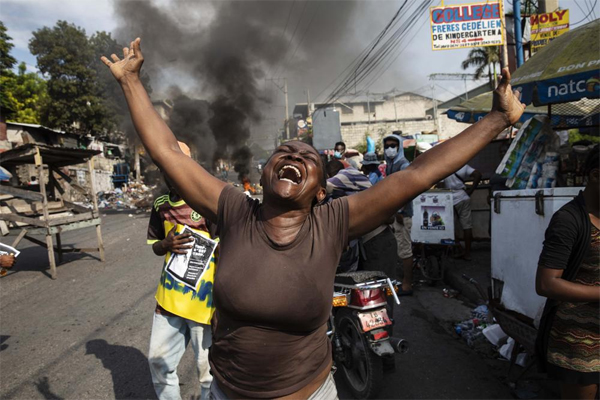
The United Nations Security Council adjourned a hearing on Haiti yesterday without a vote on whether it will support the country’s request for urgent international support to help confront armed gangs that have plunged the country into a dire humanitarian crisis. (See yesterday’s post.)
The council is analyzing two resolutions, both backed by the United States and Mexico. One would create financial sanctions for gang members and their supporters, while another would deploy a rapid-action armed force to aid Haitian police regain control of Haiti’s fuel terminal, roads and seaports, reports the Miami Herald.
“The people of Haiti are not living, they are surviving,” Haiti Foreign Minister Jean Victor Geneus said, telling the council that four million Haitian children are unable to attend school because of the gang blockade and ongoing violence, and that women and girls are being raped by armed gangs. (Miami Herald)
Haiti urgently needs “robust support” to help the police stem the humanitarian crisis, neutralize the the gangs, guarantee fuel distribution and facilitate a return to normal life, he said. (Associated Press)
Linda Thomas-Greenfield, U.S. representative to the United Nations, said during yesterday’s meeting that the rapid-action armed force resolution would propose a “carefully scoped non-U.N. mission led by a partner country with the deep and necessary experience required for such an effort to be effective.”
But Chinese and Russian representatives were skeptical and noted that some Haitian leaders have openly opposed the idea of a foreign intervention and questioned the effectiveness of such a force, reports Reuters.
Other options under Security Council analysis include enhanced UN support to the Haitian police, bilateral police training programmes and greater efforts to stop the flow of arms to the gangs, reports the Guardian.
There were demonstrations across Haiti, calling for the resignation of interim prime minister Ariel Henry, yesterday.
Lula retains increasingly slim lead
Former president Luiz Inácio Lula da Silva remains in the lead for the Oct. 30 runoff election, according to polls, but by a slim margin. The IPEC poll published yesterday gives Lula 54 percent of valid votes to 46 percent for Bolsonaro, a slightly narrow margin than the same poll gave last week. (Veja)
The Atlas poll last week gave Lula 52.4 percent of valid votes and Bolsonaro 47.6 percent. (CNN)
Brazilian polling companies have been facing threats of a government crackdown after their surveys for the Oct. 2 presidential election significantly understated the support for President Jair Bolsonaro. Allies in Congress are pushing separate initiatives, one of which would establish prison sentences for polls failing to accurately predict results, reports the Associated Press.
Whoever wins Brazil’s upcoming runoff election “will face a polarized political system, disillusionment with the political process, and tens of millions of voters who believe the other side of the political spectrum is a threat to the country,” writes James Bosworth in World Politics Review.
Brazil’s Bolsonaro allied far-right made significant gains in Congressional elections on Oct. 2. The President’s Liberal Party won 99 seats in the lower house of Brazil’s Congress, and is the single-largest party in the lower house, and with allies, effectively controls almost half of the legislative chamber, writes Raphael Tsavkko Garcia in Al Jazeera.
The left saw congressional wins too, though, notes Kate Aronoff in The New Republic. The Workers’ Party now has 68 members in the Chamber of Deputies, up from its previous 56. Indigenous leaders Sônia Guajajara and Célia Xakriabá were both elected, running with the left-wing PSOL, which increased its presence in the Chamber of Deputies from eight to 12 seats. Another PSOL candidate, housing organizer Guilherme Boulos, received more votes than any candidate in the country to represent São Paulo. Congress will also now have its first trans members, PSOL’s Erika Hilton and Duda Salabert of the Democratic Labour Party, or PDT.
More Brazil
- Defeating Bolsonaro in the runoff is necessary to defend the Amazon, but it is not enough, writes Aronoff in The New Republic. While Lula has increased his attention to environmental issues, a weak mandate would complicate his ability to push through strong rainforest protection programs. He will also have to deal with a divided Congress.
- Experts say Rio de Janeiro’s heavily armed paramilitary groups have outstripped the city’s powerful drug gangs in terms of danger, and even threaten Brazilian democracy, reports the Guardian. The violence-tracking group Fogo Cruzado claimed Rio’s militias now commanded an area almost the size of Birmingham, the UK’s second biggest city, where more than 1.7 million people lived.

Migration
- “Human mobility is increasing at unprecedented rates in a hemisphere battered by regime-driven state failures in Venezuela, Cuba, Nicaragua, and Haiti; the economic, social, and political aftershocks of COVID-19; and the ravages of the climate crisis,” writes Dan Restrepo in El País.
El Salvador
- El Salvador’s lawmakers voted to again extend a state-of-emergency that curtails civil liberties and expands police power, part of an extensive crackdown on street gangs that has been widely criticized by human rights groups. More than 55,000 suspected gang members have been since President Nayib Bukele declared a so-called “war” on criminal groups seven months ago, reports Al Jazeera.
- A Salvadoran judge has ordered the provisional arrest of several retired high-ranking members of the armed forces accused of having participated in the killings of four Dutch journalists in 1982, including former defense minister General José Guillermo García, reports the Associated Press. (See also El Faro.)
Mexico
- Mexico’s attorney general’s office said it is investigating the previous administration’s purchase of Pegasus computer spyware and whether it was carried out legally, reports Reuters.
Dominican Republic
- Haiti’s ongoing crisis has sparked a flourishing contraband petroleum market — subsidized fuel is purchased in the Dominican Republic and smuggled to Haiti, provoking shortages in the DR. (Associated Press)
Regional
- The countries of South America’s lithium triangle — Argentina, Bolivia and Chile — are anxious to take advantage of skyrocketing prices for the commodity. Each has taken a different approach to the industry, “but it’s far from clear that any of them will be able to quickly ramp up production to ease supply shortages—or that their governments will reap windfall revenues while the high prices last,” writes Thomas Graham in Foreign Policy.
- Brazil plans to nominate former central bank governor Ilan Goldfajn to head the Inter-American Development Bank, reports Reuters.
Bolivia
- Companies from China and Russia are on the Bolivian government’s shortlist for a possible partner for state lithium company Yacimientos de Litio Bolivianos, with what kind of collaboration to be determined, reports the Financial Times.
Venezuela
- U.S. oil sector sanctions against Venezuela are likely to be lifted in the short run, while gold and individual sanctions will remain for the foreseeable future, predicts the Latin America Risk Report.
Ecuador
- Ecuador’s government and indigenous community leaders reached a deal last week that encompasses 218 agreements, capping months of negotiations on how to implement implementing economic and environmental concessions granted by President Guillermo Lasso to end deadly protests in June, reports Reuters.
Jordana Timerman / Latin America Daily Briefing
http://latinamericadailybriefing.blogspot












